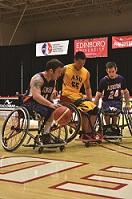

The final study highlighted all of the strengths and weaknesses of those organizations, but the one overriding and surprising discovery of the study was that there was no one-size-fits-all model, and that every sports commission was truly unique from the others in ways either large or small. Each seemed to be organized, funded, staffed, and operated in ways that were distinct for the community or host organization they served.
So, if that’s the case, how would the rights-holder or operator of any sporting event know how to choose a host community based on the services provided by a sports commission? And how should the operator of a sports event plan to work with a sports commission, knowing they’re all so different?
Based on this research and the conclusions reached through personal experience, several principles emerge concerning the best practices for any sports commission and rights-holder to practice, regardless of the many differences that exist between such organizations across the U.S. The recommendation, then, is that these four simple but overarching and critical steps that can provide information that would lead to the right selection of a host community and provide the best chances for success for both parties. This, in turn can help the event owner or rights holder know what they need to do for their part of the partnership.

1. Evaluate, Evaluate, Evaluate:
Before it is possible even to enter into discussions with the rights-holder of a potential event, the sports commission or CVB should have completed its own analysis of that event and its potential in the city under consideration. In Erie, we evaluate and rate more than 20 areas including past history of operations, estimated participation and attendance, media opportunities, and growth potential, among others.
We’d have the same expectation of an event owner or operator. In fact, we’d like him or her to spend considerable time evaluating our city’s (or any other city’s) facilities, experience and expertise, as well as the quality and scope of the services we can provide relative to the level of their expectations. Financial investment and support is usually important, but it should never be the only factor taken into consideration. When choosing a host site, knowing what a sports commission can and will provide is very important. Remember, each city and each hosting organization is different, so asking the right questions is critical to ensure all needs and expectations will be met.
2. Understand the Partnership
Sports commissions or CVBs and the destinations they represent want the same outcome as the rights-holder: a successful and profitable event. For us at the sports commission, the key focus always revolves around what we can do to further support and enhance an event. Similarly, rights-holders are best-served to ask questions early and often about how a sports commission can help. Knowing that, it’s a good idea for the rights-holder to contact a sports commission of a host destination well before an event is even scheduled.
Organizations like sports commissions and CVBs have a much greater awareness of their community and local events than the event owner or rights holder (who may be seeing the city for the first time), so they can assist with placing the event in the best spot on the calendar to maximize results based on other community happenings and hotel availability.

Likewise, sports commissions and CVBs can provide contacts and connections that will serve as shortcuts in the planning process. Hoping to avoid the hassle of finding a host hotel or accommodations for participants and guests? A sports commission can make the process easy. Need volunteers? Ask how they can help. Need sponsorship? Ask the sports commission or CVB about their role. Need help with registration? Tell them.
Any sports commission or CVB will have the appropriate contacts when it comes to securing permits, city services, contracts, and other amenities. In fact, the organizations exist to lighten a rights-holder’s load and reduce the amount of legwork in an unfamiliar location. But it’s essential to ask in advance about the services available to you. Remember, every sports commission is different, as well as the community trends and culture of each host city. What works for an event in one part of the country will not work in others. The sports commission is there to help the event owner or rights holder find the answers he or she needs.
3. Establish Mutual Goals
It’s expected that rights-holders will have lofty expectations for their events. (The sports commission or CVB does too.) However, it serves neither party well to have unrealistic, and consequently unattainable, goals.
Honesty and directness on both sides is key when producing a quality event and establishing a strong partnership. Over-estimating participation numbers, room nights, economic impact, and media exposure will only increase the chances of failure and lead to disappointment. The best approach is to be direct, so the sports commission can determine how services can best be provided to grow and enhance the event. Everyone is walking the same path, so the sports commission and the event owner are both looking for the same directions. The city is interested in much more than just room nights; they want measurable results for both parties: media exposure, economic impact, repeat events, enhanced reputations, and more. Setting realistic expectations up front helps to establish a strong foundation with all involved community partners and will help to strengthen the relationships for future years.
4.Communicate, Communicate, Communicate
This is the most important recommendation, and we’ve saved for last. It is impossible for rights-holders to ask too many questions.

A good sports commission exists to attract, host and support events. The partnership does not end when an event is committed to come to our community. In fact, for our part, we consider our job as just beginning. We want to provide as much service as we can, knowing that service often extends well past an event’s conclusion. Regular meetings, calls and e-mails help create action steps and timelines, as well as to prioritize mutual efforts and create a vision for the future. We always want to know what we can do to enhance an event and, even more importantly, what we can do differently. Sports commissions and rights-holders should work together to evaluate everything that was great and things that could have gone better. It matters a great deal to us what worked and what didn’t, as well as how we can be even better so that the event will grow and flourish in the future.
At the end of the day, the success of any sporting event or competition is also a reflection on the sports commission or CVB. So, too, is any failure. As a partner, the sports commission or CVB wants to host great events in the community so that everyone involved leaves with a positive experience to share, and hopefully return to our community again. Following the simple recommendations above can lead to the one thing everyone wants: the best event possible.

